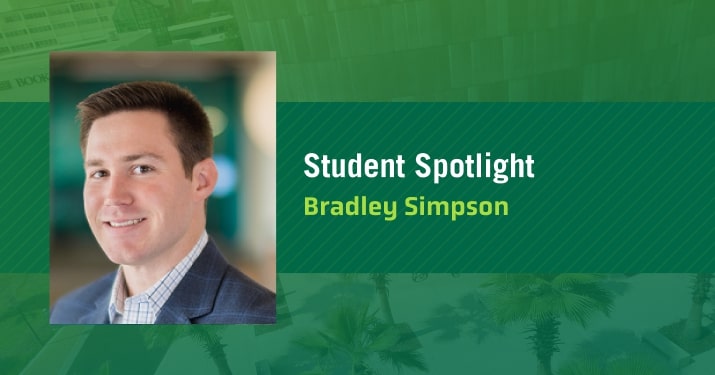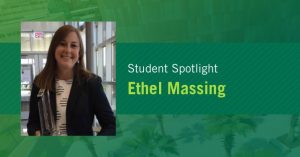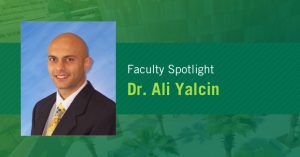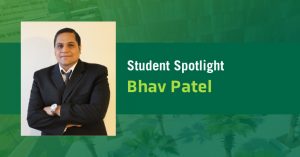Affable and ambitious, Brad Simpson did not initially set out to work in the field of health informatics. He started his undergraduate studies in hospitality management and sales, which is quite different from his current focus on pharmaceutical sales.
With a smile, he detailed the beginnings of his career: “I started out in technology sales, worked selling software with IBM and then went to AT&T. I was on their business side, and I sold software, hardware and communication services to small and medium business accounts.”
Arguably a unique start for a healthcare or health informatics career, Simpson found that his skills and knowledge in sales transferred well into the pharmaceutical industry, ultimately launching his current career trajectory. While reflecting, he recalled, “I really wanted to find a way to combine some of my technology background with what I was learning in healthcare… I thought an [MSHI healthcare analytics] would help give me a formal introduction to that convergence as well as prepare me for taking that leap into a new career.”
Choosing USF Health
Simpson knew that he wanted a completely remote degree program when selecting a program. “From a scheduling and lifestyle standpoint, an online learning option fits my life better than a traditional in-person school. I can study as I need to; for me, that often means an hour of studying most weeknights, and then really dedicating the weekends to it,” he explained. The remote format gave him the ability to juggle his career and education successfully, as well. “I travel a lot for work, so being able to dictate where and how I study was one of the most important things.”
Though the remote option was crucial, it wasn’t the only quality that made the program stand out in his search. “That was high up on the list, but I also cared about USF’s standing within the academic community.”
USF Health’s Morsani College of Medicine is not only a reputable college of medicine, but it was the nation’s first to offer a Master of Science in Health Informatics completely online. The program is also a HIMSS (Healthcare Information and Management Systems Society) Approved Educational Partner, which stood out to Simpson during his search. He emphasized, “I liked that USF has a HIMSS association and is one of the top-ranking schools in the field.”
Some features of USF Health’s program weren’t part of Simpson’s initial decision but paid off in hindsight. “I appreciated the eight-week course model because it allowed me to take only one class at a time and to complete only four courses a year. A traditional schedule would have required me to double up on classes, but the eight-week model allowed me to concentrate on each subject more deeply.”
Overcoming Challenges with Support
Simpson had a lot to juggle while in school, successfully overcoming his own challenges with self-discipline and his support network. He had to learn to be a student again, polishing up critical skills like writing and time management.
“I’m not a naturally strong writer. I write emails at work and that’s about it. Going back to writing papers and doing citations wasn’t easy, but it’s a necessary skill,” he stated. When asked about tips for prospective students, he continued, “I would recommend to other students that they ease into it, especially if they’ve been away from school for a long time.”
In addition to in-class support from professors, Simpson relied on his Bisk Student Success Coach to help navigate the program. “I should start by saying that Doug Maine is the best. He’s been a lifesaver through this process between juggling a full-time job, school and a child on the way…he even navigated for me what classes to take and in what order, so that I wasn’t taking on too much at one time. That was super helpful,” he stated.
Remote Learning and Immediate Value
We asked Simpson to detail his experience with the virtual classroom, since he specifically sought out remote options while researching programs. Not only did the online format allow him to work from anywhere as he traveled for his job, but the pacing and style of engagement was ideal, too.
“[I like] the pace of the discussion boards. I like that there’s a flexible structure for students like me. I can be really engaged with them one week, and the next, if I’m a little more relaxed in my approach, that’s also okay. Discussion boards create a kind of communication that, for me, would be hard to replicate in the classroom.”
Something else Simpson was sure to highlight was the expanded perspective on the healthcare industry he got through interaction with classmates through discussion boards.
“It’s especially valuable for my line of work because I can see a wide variety of perspectives through them. I work in the pharmaceutical side of healthcare, so I don’t interact as much with patients or providers themselves. But on classroom discussion boards, I’m interacting with people in the industry from all kinds of backgrounds, people who are more hands-on with patients and process, and that’s been extremely helpful for me.”
Not only did these interactions grant a more holistic view of how pharmaceuticals fit within healthcare, but the course concepts were often immediately applicable at Simpson’s job. His favorite classes involved workflow and process management.
“For example, HIM 6667 has been personally really helpful for me in my career. It’s helped me actually use what I’ve learned about mapping workflows, the flow of information and applying that directly to the patient care continuum. How the patient moves through their own care process, and how I personally can benefit providers and their patients.”
What’s Next?
Simpson has already used his degree to move into his next position. As his career journey continues, he’s open to different possibilities that involve “working at that intersection of information technology and healthcare, whether that is helping organizations care for their patients and creating optimal outcomes or consulting and helping implement new processes.”



